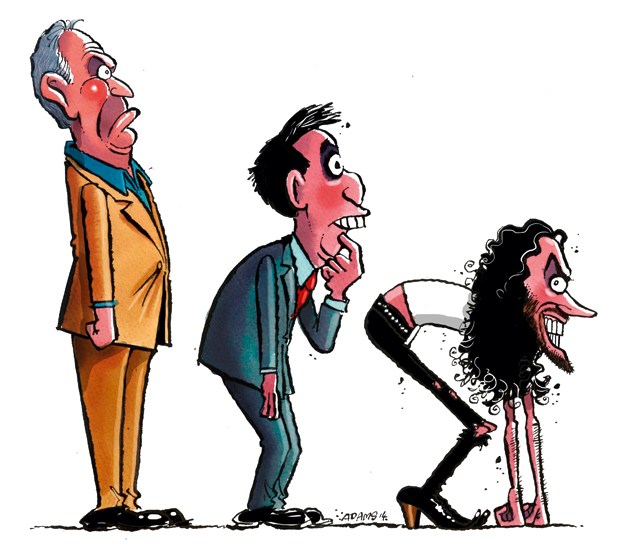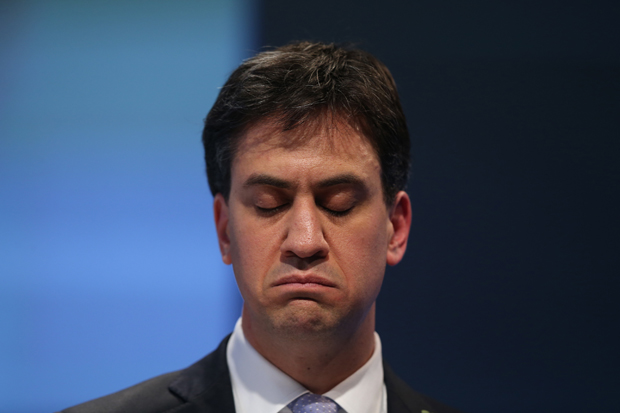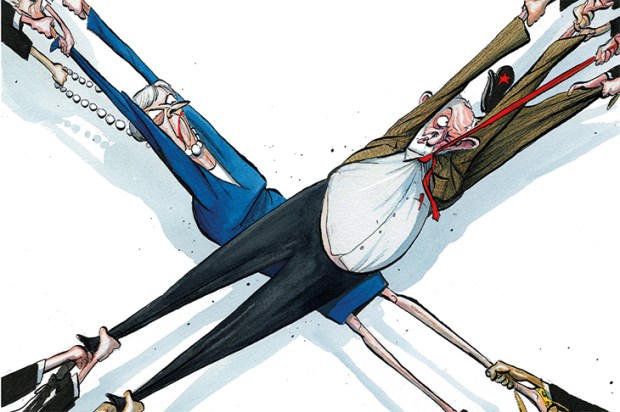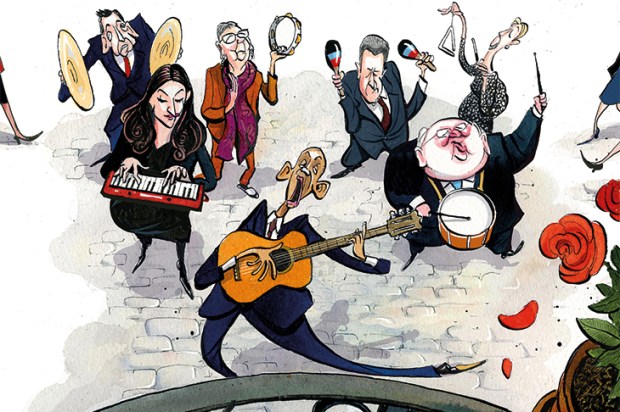Listen
Ed Miliband is the least of Labour’s problems. Its troubles go far deeper than any individual. They are structural and, potentially, fatal. It is certainly easier for Labour MPs, and ultimately more comforting, to concentrate on Miliband’s deficiencies as a leader than the existential crisis facing the left. But until somebody comes up with an answer to the question of what the party is for — in an era of austerity and globalisation — it will be stuck in a death spiral.
The Labour party has always believed in spending money for the common good. Public spending was the glue that held together the traditional Labour coalition and the New Labour one. Tony Blair increased public spending from 41 per cent of GDP in 1997 to 44 per cent in 2007 — the second largest rise in the developed world in this period. By the time Labour lost power, 53 per cent of GDP was being spent by the state.
Miliband is far more left-wing than Blair, but he can’t promise increases anything like that. As he meant to say, but infamously forgot to, in his conference speech this autumn, ‘There won’t be money to spend after the next election.’
An absence of public money makes it that much harder to promise people that if they vote Labour, their lives will improve. Miliband is having to try to keep the party’s electoral coalition together without the key binding ingredient. This opens up space on Labour’s left, which the SNP and the Greens are busily trying to occupy.
These difficulties are compounded by globalisation, which severely restricts governments’ freedom of action. If governments try to raise taxes too much, businesses and people simply move elsewhere. Socialism in one country isn’t an option any more.
When François Hollande came to power in France, Miliband hailed the new president as someone who understood ‘that something can be done’. Two-and-a-half years on, unemployment in France is up to 10.5 per cent, only 12 per cent of voters approve of what Hollande is doing and the economy is flatlining. Most damningly of all for Miliband, Hollande has had to abandon socialism and appoint a reformist prime minister, Manuel Valls, who is overseeing €40 billion of tax cuts for business, paid for by €50 billion of cuts in public spending. So much for Miliband’s claim that Hollande would prove that ‘it doesn’t have to be this way’.
Hollande’s difficulties can be traced back to his commitment to introduce a top tax rate of 75 per cent. In this era, when people are more mobile than ever and governments rely on a decreasing number of income taxpayers for a larger and larger share of their revenues, national leaders can’t afford to have dramatically higher tax rates than other countries. If you try to squeeze the rich now, they leave long before you can hear the pips squeak.
Politicians can’t be heroes any more. Instead, they have to operate within the tightly drawn tramlines of the global economy. This is true for those on the left and the right, but the pressure that this places on countries to adopt a low-tax, light-regulation regime is something with which the right is far more comfortable.
Labour’s electoral position is under threat from parties that reject the economic constraints of globalisation. The Greens, according to the latest ICM/Guardian poll, now command 6 per cent support — a sixfold increase on what they polled at the last election and, to put it in perspective, twice what Ukip scored then. Even more alarming for Labour is what is happening in Scotland, one of the party’s traditional strongholds. Polls suggest that Labour’s number of Scottish seats could fall from 40 to ten, or even as few as four, next May, with the SNP garnering more than 40 per cent support. Labour’s position is probably not as dire as that, but its iron grip on Scotland appears to have been broken.
Scotland is a demonstration of what can happen when a nationalist party moves to the left. The worry for Labour is that Ukip could be undergoing the same transformation. Ukip has, since its foundation, been far more of a problem for the Tories than Labour: it was a libertarian, Euro-sceptic splinter from the Tory party, after all. Its one MP used to be a Tory, it draws more votes from the Tories than any other party and it is almost certain to win a second seat from them in the Rochester by-election next week.
But Ukip is changing rapidly. It is no longer a libertarian party. Instead, it now opposes efficiency savings in the National Health Service, the US-EU free trade deal and the so-called bedroom tax. These positions are combined with the most popular policy on voters’ biggest concern, immigration. If Ukip continues on this journey, it will become a serious threat to Labour in its heartlands in the urban north. Indeed, in the recent Heywood and Middleton by-election, Ukip cut Labour’s majority from almost 6,000 to a mere 617.
Then there is Russell Brand. It might seem absurd for an article on politics to discuss a priapic comedian best known for making an obscene crank call to an elderly actor. But Brand is fast becoming one of the most popular street captains of the left-wing mob. When he recently urged his followers to sign a petition calling for a parliamentary discussion of drugs, one of his specialist subjects, it sailed through the 100,000 barrier needed to secure a Commons debate. But what should most alarm the parliamentary left about Brand’s emergence as a political figure is that he believes people should not vote: a self-defeating electoral strategy if ever there was one.
Miliband’s aim when he became Labour leader was simple. He believed that by uniting the left as the right split between the Tories and Ukip, he could win power and overturn the Thatcher-Blair consensus.
As the most left-wing Labour leader since Neil Kinnock, and the greenest, he seemed well placed to bring the left together. He was comfortable honouring its tribal traditions in a way that his recent predecessors have not been. Unlike John Smith, Tony Blair and Gordon Brown, he attended the Durham Miners’ Gala. He also made a point of going on a trade union anti-austerity march, comparing it to the civil rights protests that Martin Luther King led in the United States in the 1960s. But despite this no-enemies-to-the-left approach, he is still faced with a fracturing of his support.
As if these problems were not enough, Labour finds itself trying to straddle the growing divide between London and the rest of the country. Half the Labour membership lives in the capital and the importance of this has been radically increased by Miliband moving the party to a one member, one vote franchise for leadership elections. But London MPs only make up 17 per cent of the Parliamentary Labour Party. This wouldn’t be a problem if London and the rest of the country thought alike. But on immigration the capital takes a radically different view to the rest of the country. Polling by Oxford University’s Migration Observatory in 2011 showed that less than half of Londoners — 46 per cent — favour reducing immigration, while the figure is 70 per cent in the north and 75 per cent in the Midlands and Wales. It is hard to see how Labour can please both its London members and its voters elsewhere in the country on this crucial issue.
Normally, a party in Labour’s situation would look around the world for inspiration, for a model to copy. This is what Labour did in the 1990s. The Clinton Democrats inspired their presentation (New Democrats/New Labour), their campaign techniques (the war room), and their policies (tax credits). But the centre-left is in disarray across the industrialised world: there is no model to copy. Indeed, in Greece and Spain parties of the radical left have usurped the role of the traditional centre-left parties and now lead in the polls.
To be sure, the Tories are not short of problems either. The fracturing of politics has hit their support, too; it is impossible to see how they can hit 40 per cent with Ukip polling so high. They have not won a majority for 22 years and, even against Miliband and Labour with all their problems, are highly unlikely to do so next May. But austerity and globalisation do not pose existential questions for the centre-right. Rather, austerity presents them with an opportunity to shrink the size of the state. Also, the pressure to keep corporate and top income tax rates down strengthens the right’s hand — offering a justification for positions that are bound to be unpopular in the current populist political climate.
Labour could still eke out a win next year. A combination of the rise of Ukip, the decline of the Liberal Democrats and favourable constituency boundaries could see them stagger back into office. But this would be a self-defeating victory. A Labour government making massive cuts to public spending would simply speed the rise of the Greens, the SNP and Ukip, and Labour’s decline. In 2020, Labour could find itself being supplanted in Scotland by the SNP and its hold on the urban north significantly weakened by Ukip.
Ed Miliband may not be a natural leader. But those who think that getting rid of him would solve Labour’s problems are deluding themselves about the disaster that the left faces.
Got something to add? Join the discussion and comment below.
Get 10 issues for just $10
Subscribe to The Spectator Australia today for the next 10 magazine issues, plus full online access, for just $10.
You might disagree with half of it, but you’ll enjoy reading all of it. Try your first month for free, then just $2 a week for the remainder of your first year.















Comments
Don't miss out
Join the conversation with other Spectator Australia readers. Subscribe to leave a comment.
SUBSCRIBEAlready a subscriber? Log in